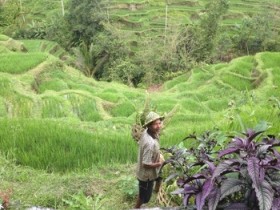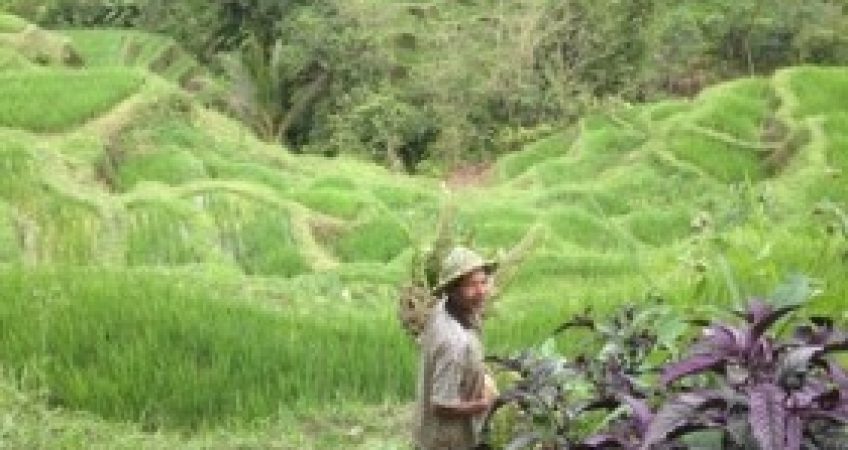
As all the stress begins to melt away one drop at a time, you are returned to your core. Bali is magic and not because the Balinese still worship the supernatural. There is something much deeper than meets the eye. This is what I discovered while being on a month-long holiday in Bali.
Beyond the chaotic traffic, hundreds of scooters beeping their way through two lanes of traffic turned into four, one begins to discover there is a natural flow on Bali, reflected in even the traffic that Westerners would be appalled by. It’s the flow the Balinese seem to understand very well, like the flow of blood in our veins. Once plugged into that flow, the chaos seems normal, and as you let go of control, the flow takes over you, as it did me.
From the perfectly-sculpted rice terraces, to the luscious green jungles, or to the vast Indian Ocean, everywhere you look there is immense natural beauty. Although the Balinese unfortunately have not yet discovered recycling or preserving nature, looking past all that, one can’t help but think this is paradise. Living amongst nature is Balinese way of life, reflected in their architecture in the traditional “bale”-roofed open homes and villas. Their temples have open plans as well, and there are thousands of them everywhere you go in Bali, with exquisite stone sculpting and intricate wood work, inlaid with gold, red, and blue adorning temples lucky enough to have been restored. All this nature is inspiration for creativity and the Balinese are extremely talented artists as we saw in their streets filled with art vendors — wood carvers, stone carvers, painters and furniture makers as far as the eye can see.
The Balinese are the happiest and kindest people I’ve ever met. You recognize the humanity looking in their eyes and recognize their content with life through their smiles. Even though most of them live in poverty by Western standards, there is a sense of gratitude and appreciation that exists. Community is ever-present — taking care of others, even strangers, is considered normal for them. Devoutly religious with an interesting blend of Hindu and Buddhist traditions, they are always asking for protection, happiness, and health for others, marked by blessings conducted twice a day. At the villa where we stayed, Wayan, our house-keeper, explained to me they pray so that their visitors have a happy time, a safe and enjoyable stay. Balance is key to the Balinese — and maintaining this energetic balance is what they strive for through self-less blessings and ceremonies every day.
For me personally, Bali has helped me regain my sense of self and reminded me how human connection is the key to happiness. Living amongst people who are genuinely happy, who genuinely care for others, and are self-less and giving, not because they are materially well off, but because they have a richness of spirit, so evident with the lovely smiles you get everywhere you look, makes you ponder your own state of happiness. Why is it that with all the material comforts and objects we surround ourselves with, we feel more and more disconnected?
It’s obvious to me that in Western cultures, feelings of disconnection stem from our belief that happiness lies in material wealth and success. On the contrary, the Balinese know it lies in our heart and in our willingness to share our hearts with others. It requires vulnerability and taking a risk to connect with the other. This fundamental core of who we are is lost in our insatiable hunger for more as that competitive spirit separates us from each other. And as we grow more and more separate, the pain and loneliness manifests itself in a myriad of ways, but primarily in unhappiness. When is the last time you’ve seen a stranger genuinely smile to you while walking down the street?
As I sit on the long journey home and reflect on the gifts I’ve received from Bali, my intention is to cling to the humanity I’ve rediscovered in myself. And I pray that others back home have the courage to do the same, so that we all might once again integrate back into the natural flow of life.
Monique Svazlian cpcc-acc
Huffington Post

